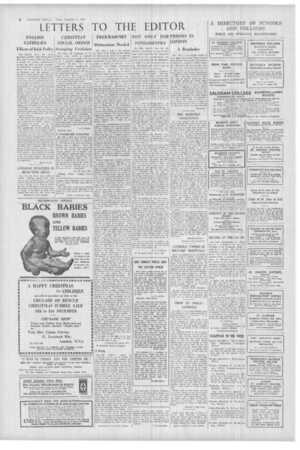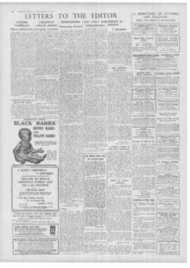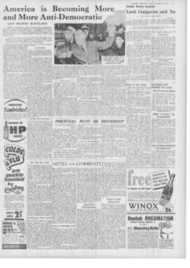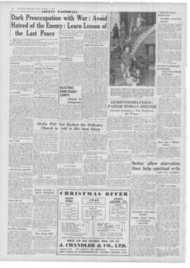Page 2, 6th December 1940
Page 2

Report an error
Noticed an error on this page?If you've noticed an error in this article please click here to report it.
Tags
Share
Related articles
Freemasonry British And Continental
The Campaign For Freemasonry
A Correction
A Secretive Society Without Secrets
Why Do We Make A Fuss About Masons?
FREEMASONRY Distinctions Needed
SIR.—May I make a few remarks in regard to the letters on the subject of Freemasonry which have appeared in the CATHoLlc HERALD, and begin by saying that, if any distinction is to be made it should be between "Continental " and English Freemasons,
not between " Continental " and English
Freemasonry? The majority of English Freemasons know nothing about the true aim. secret and nature of the society, hut it is one of the recognised exponents of Freemasonry, Albert G. Mackey, who informs us that: " Masonic ritual differs in different
rites and jurisdictions. But this does not affect the universality of Freemasonry. The ritual is only the external and extrinsic form. The doctrine of Freemasonry is everywhere the same." The " doctrine of Freemasonry" shows that it is anti-Christian and atheistic; even in its least obnoxious form it attempts to make purely natural religion take the place of the supernatural and revealed religion of Christ, and in his Constitutions Anderson says that " the religion of all good men " is the religion of Freemasonry, a statement which the late Sir Alfred Robbins,
Past Grand Warden of the Grand Lodge of England has expanded by adding the words, " irrespective of race, class or creed "l These statements are a denial of the Christian faith.
Freemasonry was established by the Grand Lodge of England on the Continent between 1721 and—roughly-1738, and the Continen tal lodges were subject to Grand Lodge for Some years later. Evidently it was not con sidered even then as " a highly benevolent
and respectable institution as harmless as the Quakers " as Mr. F. D. Chambers says,
since a few years after it had been established in Holland and within twenty years after the foundation of the Grand Lodge of England
in 1717, the Protestant Magistracy of Hol
land condemned Freemasonry in 1735, and the Protestant States of Zurich, Berne and Geneva soon followed Holtand's example. The Church did not condemn Freemasonry until 1738.
English Freemasonry carefully cultivates the opinion that it is " different " from " Continental Masonry," and informs us that Grand Lodge broke with the Grand Orient of France which was the great strong hold and tangible expression of "Continental Masonry " many years ago. It is quite true that Grand Lodge broke with the Grand Orient in 1877, but it still continues relations with certain Masonic ritee that have never broken with " Continental Masonry " arid is in official communication with the Alpine lodge which is the connecting link between English and " Continental Masonry."
On his return from his official visit to the Manic organisations in North and South America and Europe the late Sir Alfred Robbins publicly eulogised the Freemasonry of the Spanish and Portuguese lodges, and hoped that as a result of his visit there would be a better understanding and closer union between English Freemasonry and that of the Latin countries, i.e., " Continental Masonry."
In an address at a reunion of AngloForeign Masons on October 16, 1934, the late Lord Ampthill, Pro. Grand Master of
the Grand Lodge of England. seid " England has become the sanctuary of those who
will some day revive the Freemasonry which has been so nearly exterminated in some parts of the Continent of Europe and is gravely threatened in others," and he men tioned the Pilger-and Deutschland lodges of Germany and the Italia lodge as those which would resurrect Freemasonry in their respective countries. Here we have the definite pronouncement of the Pro. Grand Master of English Freemasonry that Eng land, or rather English Freemasonry, has become the sanctuary of the " Continental Maeonry " with which it is alleged it has severed all connection! It is a Protestant clergyman who writes: " The Protestant claims that the Reformation cut out the pagan element (from religion), Well, in 1717, Masonry cut out the Christian element. and so, logically, Protestantism should be the strongest antagonist of Freemasonry. Yet she is more than any other section of Christendom who condones it. Does she condone Masonry simply because Rome condemns it?" (The Menace of Freemasonry to. the Christian Faith, by the Rev, C. Penney Hunt, B.A. fifth edition, 19)4, p. 64). This is a straightforward statement. The writer realises what Mr. F. D. Chambers does not, that Freemasonry—and it is of English Freemasonry the Rev. C. Penney Hunt writes—undermines and ultimately destroys the supernatural faith of those who follow its teachings. The Church condemns Freemasonry not " merely " because it is a secret society. as Mr. Chambers informs us, but because it is wicked. She does not tell Catholics to " avoid " the society, she for bids them under pain of excommunication to join the society or to remain in it be cause it is anti-Christian and atheistic; its " doctrine is everywhere the same." It is the apologetic attitude of some Catholics which damages Catholicism more than what Mr. Chambers calls " hysterical condemnation "; the Church does not indulge in hysterics. Nor does the fact that a man " lives in Ireland " mean that he is obsessed by the fear or notion of " secret criminal societies." If Freemasonry had had less to do with English rule in Ireland in the past there would perhaps have been a better understanding of Ireland's rights on the part of English statesmen and politicians, and a greater willingness to give back what was— and is—justly withheld.
apologise for the length of any letter which, long as it is, does not, of course, say all that could be said.
STANISLAUS M. HOGA/4, O.P. St. Magdalen's Rectory, Drogheda.
A Reply
Spa—The " Evidence " supplied by " Catholicus " would not be accepted in any English Court of Law. Catholics who hold these views about Masonry, or for that matter about Jews, should recollect that great numbers of Protestants hold similarly strong views about Jesuits whom they regard as the most powerful secret criminal society which ever existed, Anti-Semites in quite a number of cases believe similarly in the stories of Jewish ritual baby sacrifices. The fact is that none of these accusations could stand cross-examination in an English Law Court. I know nothing about foreign Masonry and no doubt the Sacred Congregation of the Consistory was judging some Italian Rotary Clubs which had been corrupted by Latin atheism. My only point is that English Masons and English Rotarians should not be condemned because there is not a smattering of evidence against them, and thousands of Englishmen know this from intimate inside knowledge. As for Rotary, there is no nearer approach to the old Catholic Guild. Its sole business is to encourage business men 'to conduct their businesses on Christian principles. It is exactly the sort of movement that would be rich soil for Catholic cells about which we hear so much from Catholic Action. If Catholics are discouraged from associating themselves with such then the idea of permeating our pagan society with
Catholic Truth is pretty hopeless. Any Rotarian hearing that Rotary had been condemned by the Church would scarcely have patience to listen to any arguments in favour of the Church. Evidently Catholics living in Ireland do not understand English conditions.
F. D. CHAMBERS.
blog comments powered by Disqus









